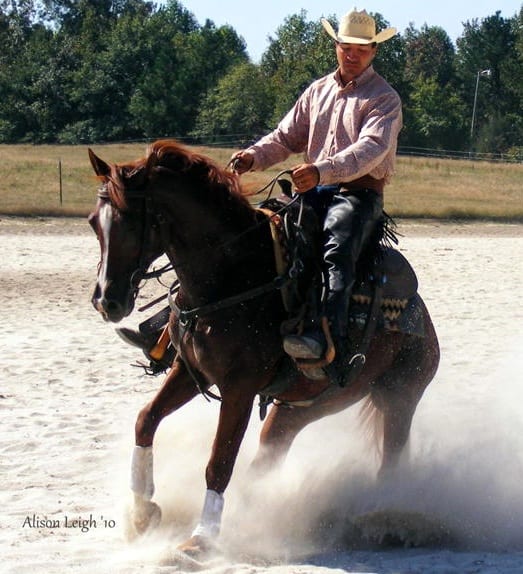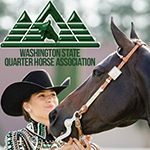Have you ever wondered what it is like to show an Arabian in Reining events? Well, GoHorseShow tracked down NRHA judge and multiple champion trainer Jesse Chase of Wendell, North Carolina to find out. This young talented trainer is starting to make a name for himself in the Arabian industry.
Recently, Chase came home from Arizona as Reserve Open Champions in the Scottsdale Arabian Reining Futurity Classic with the horse, Move It On Over (Ninja). Chase tied to win it, but scored lower in the subsequent run off. It’s not every day that your primarily AQHA/NRHA Reining trainer wins reserve at the biggest Arabian Reining event in the country. Chase and Ninja were also the Purebred Limited Open Rider Champions.
The Scottsdale Arabian Show is the premier Arabian horse show and their largest reining event in the world with $50,000 added to their futurity. This event is the largest of the Arabian industry hosting almost 2500 horses with owners from all over the world. It is also the oldest show in the Arabian breed dating back to 1955, and it is one of the few shows that displays the Arabian in all of its versatile disciplines from western pleasure, halter, saddleseat, over fences, and reining to name a few.
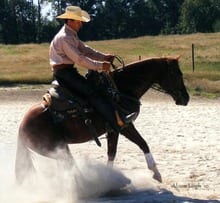 Chase says that it is a very popular show for the reining because there is a full slate of reining classes offered including the four and five year old futurities. The purebred futurity pays twenty thousand while the half Arab futurity pays forty thousand to win.
Chase says that it is a very popular show for the reining because there is a full slate of reining classes offered including the four and five year old futurities. The purebred futurity pays twenty thousand while the half Arab futurity pays forty thousand to win.
This talented 36 year-old says that his reserve championship was somewhat unexpected but says he would not have traveled all the way to Arizona if he didn’t think he had a good chance of winning.
“I had a very talented, very broke horse that was more than capable of winning but did not feel like he was at peak performance level at the beginning of the show. We were struggling with lead changes schooling earlier in the week but luckily improved ride after ride until Ninja peaked for the finals,” Chase says.
Jesse explains that the Arabian breed is very different from quarter horses when it comes to reining. “I use all the same training techniques but find that the Arabians differ greatly both mentally and physically. A lot more of the Arabians flunk out of the program, but that is the price to pay in order to progress the sport of reining within the Arabian breed.” However, Chase adds that, “They are great lead changers and naturally very supple.”
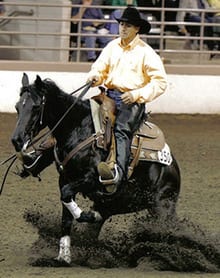 The Arabian shows are more comparable to AQHA shows than NRHA simply because of the different disciplines all competing at the same venue, Chase explains. “Warming up is often a challenge because space is limited and having to warm up with saddleseat, driving, and the slower western pleasure horses makes it harder to navigate in a warm up pen.”
The Arabian shows are more comparable to AQHA shows than NRHA simply because of the different disciplines all competing at the same venue, Chase explains. “Warming up is often a challenge because space is limited and having to warm up with saddleseat, driving, and the slower western pleasure horses makes it harder to navigate in a warm up pen.”
According to Chase, there are some NRHA trainers with a heavy Quarter Horse background that have gotten into the Arabs because of the money, and there are now Arab trainers that train mostly reining horses.
Chase primarily specializes in training and showing reining horses and some working cow horses. This horseman has been judging NRHA and NRCHA shows for ten years now and has owned his own business, Jesse Chase Performance Horses, in Wendell, North, Carolina for the past eight years.
Jesse has won several NRHA futurities and derbies and also an APHA Reserve World Championship. He also has numerous wins from his amateurs and non-pros– including other world championships and reserve championships, regional championships, and also national top tens. He is also a graduate of State University New York (SUNY) where he studied reining horses under Spike Holmes.
GoHorseShow.com asked Chase the obvious question of how he got involved showing Arabian reiners. He explains that he first did it as a favor for a friend. “I broke one of his Arabs with the slight chance it could make a reiner, but more than likely it was going to be a trail horse,” he remembers. “After a few rides, we were both pleasantly surprised that the purebred gelding, MC Justa Promotion, showed much talent and has since won numerous championships and national top tens.”
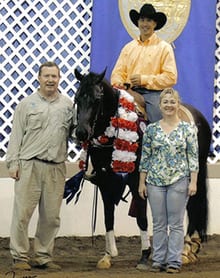 Jesse says that one memory stands out so far in his Arabian reining venture. “I rode a horse named MC Sirod a few years ago at the Region 15 Championships. It was one of my first AHA (Arabian Horse Association) shows and nobody knew me. He was very difficult to prepare,” Jesse recalls. “I had to demonstrate some very unorthodox techniques in order to get him ready. People were looking at me like I had three heads. I got him on track; threw a big bow in the reins and ran through the gate. Sirod won the regional championship with a 74 and now everyone knows exactly who I am at the Arabian shows. Consequently, I still ache a little in spots from getting that horse ready!”
Jesse says that one memory stands out so far in his Arabian reining venture. “I rode a horse named MC Sirod a few years ago at the Region 15 Championships. It was one of my first AHA (Arabian Horse Association) shows and nobody knew me. He was very difficult to prepare,” Jesse recalls. “I had to demonstrate some very unorthodox techniques in order to get him ready. People were looking at me like I had three heads. I got him on track; threw a big bow in the reins and ran through the gate. Sirod won the regional championship with a 74 and now everyone knows exactly who I am at the Arabian shows. Consequently, I still ache a little in spots from getting that horse ready!”
Chase concludes his thoughts by saying that he likes to be involved with the development of the Arabian breed from a reining standpoint. “Reining is just now being very actively promoted. I like to think that one or more of the horses I am training may become the foundation breeding stock for future great Arabian reiners,” he says. “I also like the level playing field. With quarter horses, genetic progress has escalated to the point that you are only as competitive as the horse you ride. I often struggle to get my hands on those high caliber quarter horses. Arab reiners are not yet at that point; it is still a training contest. We are dealing with animals that have no natural or genetic instinct to be doing these maneuvers. Therefore, if you are a good trainer and showman you have just as good a shot as the next guy.”


